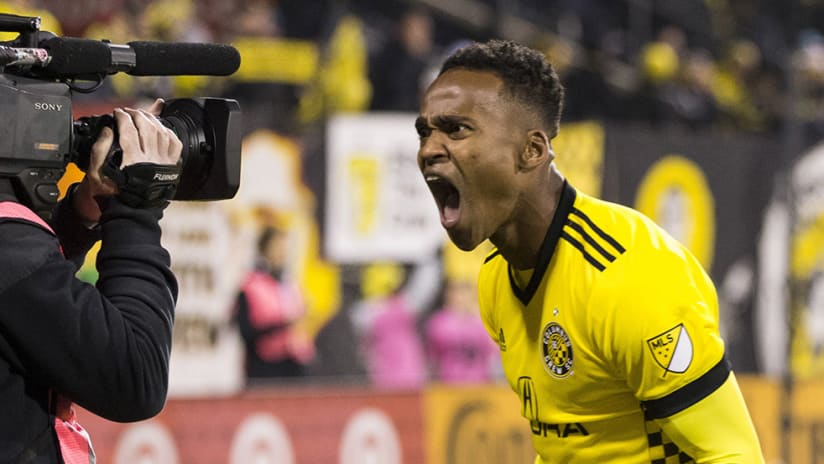In a January weekend packed with noteworthy personnel moves, the LA Galaxy and Columbus Crew SC made one of the bigger ones: When the dust settled, the Galaxy had shipped Gyasi Zardes and at least $400,000 in TAM to Crew SC for Ola Kamara.
Just what does it all mean? Here’s a breakdown:
LA Galaxy
The Galaxy appear not to have rated Gyasi Zardes. Or, at least, did not rate him as a center striker.
Perhaps head coach Sigi Schmid liked Zardes in other spots, but the wings are currently occupied by Romain Alessandrini and Sebastian Lletget.
I’d personally like to see Zardes moved to right back – a standard move for a player with above average athleticism but not quite skilled enough to lead an attack – but the Galaxy just invested in Venezuelan national team member Rolf Feltscher.
If Zardes didn't start up top, he would have become an expensive reserve option for LA ($577,000 according to numbers released by the MLS Players Union).
34 goals in two @MLS seasons.
— LA Galaxy (@LAGalaxy) January 20, 2018
A look at what @OlaKamara can do: https://t.co/jNXNFpkkWS#LAGalaxypic.twitter.com/MfqHyXqnUx
Now Kamara fits what the Galaxy needs. Put simply, he’s efficient in the box. He’s good at finishing scoring opportunities. With the aforementioned Alessandrini and Lletget, plus Gio dos Santos, Jonathan dos Santos, and Ema Boateng providing passes into the box, whoever plays forward should get plenty of opportunities in front of goal.
The Galaxy have a potentially dominant front six (if there was an option in Google Docs to emphasize the precarious nature of a word, I would used it three times on “dominant”) and they feel they need someone to finish off the chances they create.
On a secondary level, Kamara is slightly better in combination play than Zardes. Kamara isn’t exactly a technical wizard, but he reads combination opportunities well and knows when to provide an option and how to link with teammates. Dos Santos and Alessandrini would both rather combine toward goal than dribble directly, so they will appreciate having a better link-up player in their line of sight.
Columbus Crew SC
Kamara recently asked for a trade. As one GM recently told me, “once the s* hits the fan, it’s really tough to stop it.”
It doesn’t mean the team has to trade the player, but it creates difficult dynamics. A coach – especially one as tactically detailed as Gregg Berhalter – always needs to be able to trust his player. Once a player says he wants to leave, you never know what you’re going to get. At worst, the player may intentionally slack off to force the trade; at best, he already said he doesn’t want to fight for the shirt anymore.
Additionally, on a human level, a coach always needs to build credit with both his team and players around the league. No employee in the world wants to be held hostage by his boss. In showing a move of good faith, Berhalter builds credit with players around the league.
It’s not exactly bad business from a soccer standpoint, either. Not long ago, Zardes was a rising star in both MLS and the US national team due to his pace and energy. He’s become the butt of a lot of jokes because of his poor first touch. But two things:
- Zardes' first touch comes and goes with confidence and Zardes certainly hears all the jokes;
- Berhalter is the kind of coach who will put Zardes in a position to play to his strengths and hide his weaknesses.
There’s the old saying in investing: buy low. In terms of a straight swap, it may turn out that an energized Zardes is a more valuable player than a cranky Kamara.
The Crew also received $400,000 in TAM, and potentially an additional $100,000 if Kamara scores 12 or more goals in 2018. It’s tough to tell what the TAM adds to the deal because we don’t how the TAM will be used by Crew SC.
The Players
Zardes gets a fresh start. And if you don’t know the value of that, then good for you; you’re living a blessed life.
As for Ola Kamara, he gets pretty much the same thing we all want: money and stability. As reported by Sam Stejskal, Ola Kamara wanted a new deal. He was also fluxed by the questions surrounding the future of Crew SC. The trade to the Galaxy solves both those problems.
As part of the trade agreement, as reported by the LA Times, the Galaxy offered Kamara a new contract, presumably with more years in LA (security), and a raise on his reported $482,000 salary (money).
Who Wins?
The Galaxy probably receive more upside – they got the one piece they needed most – but that’s to be expected.
Crew SC had the worse hand to begin with: a star player who wanted out. At that point, it’s about getting the best deal you can (somebody CC the Revs on this, please). They certainly could have done worse. Zardes has been down lately, but he certainly has the raw tools that Berhalter has proven capable of molding.
More than either team, though, the winners are the players. Kamara wanted a new contract and got it. Zardes received a desperately needed second chance after his career hit a giant chasm, and he needed a new route.
Zardes escaped a less-than-ideal situation in LA. And Berhalter perhaps did the best he could in a tough spot by trading his leading scorer. It was a risk worth taking for both of them.













